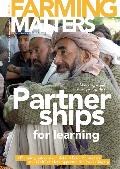Learning plays an important role in the transition towards a more sustainable world, says Arjen Wals
“people learn more from each other when they are different from one another than when they are likeminded”
Almost 50 years ago a UN goal was formulated that still hasn’t been realised today: clean drinking water for all. By contrast, in less than 10 years, the corporate world has succeeded in rolling-out wireless networks and cell phone technology all over the planet. Stories of people, rich and poor, becoming dependent on, and even addicted to, cell phones are plentiful.
Stories of people, rich and poor, becoming dependent on, and even addicted to, cell phones are plentiful. In South Africa I was recently told stories of young women with HIV/AIDS who get an extra government allowance to support their children, and use it to feed their phone before they feed their children. In the meantime, about 425,000 cell phones are discarded everyday in the United States alone!
I am using the cell phone as a metaphor for non-sustainability, an illustration of the impact of the high-speed train of economic globalisation that we all seem to be riding. But is there a way out?
The nature of the sustainability crisis – which involves high levels of complexity and uncertainty – suggests that people will need to develop capacities and qualities that will allow them to contribute to alternative behaviours, lifestyles and systems, both individually and collectively. “Learning”, rather than consuming, is increasingly seen as the key in the transition towards a more sustainable world.
Learning-based change, anticipatory learning, collaborative learning, community problem-solving and social learning, represent just a few related concepts that are connected to our quest for sustainability. It is through various forms and blends of learning in formal, non-formal and informal settings, that a more resilient society can emerge: one that has both the desire and the capacity to challenge existing systems, routines, norms and values, and to create alternative and more sustainable ones.
Social learning appears to have merit here as it emphasises the cultivation and utilisation of pluralism, including a pluralism of values. Put simply: people learn more from each other when they are different from one another than when they are likeminded. But this only happens when there is “chemistry” or social cohesion within a group. It is easy to see that the homogenising tsunami of economic globalisation which privileges one type of values – material ones – and which is supported by omnipresent ICTs, undermines the potential for this type of learning.
We need to start thinking in terms of “learning configurations” consisting of multiple actors, groups, organisations and networks that may not immediately see the obvious connections that they have with each other, since each occupies its own niche and represents its own interests. Their commonalities and complementarities can be discovered by focusing on a jointly perceived sustainability challenge. Such emerging practises may offer clues and inspiration for similar initiatives elsewhere.
Text: Arjen Wals

